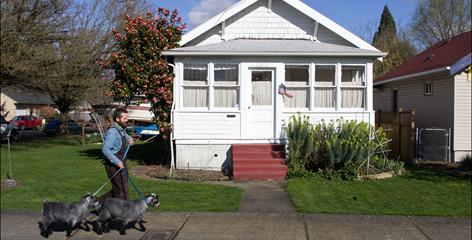
Looking for a pet that can live in your urban yard, answers to its name, wears a leash for strolls - and might produce milk you can drink or turn into cheese?
Meet the miniature goat.
That's the case goat fans are making to city officials across the USA. Hillsboro, Oregon., held three community meetings this year, including one last week, to ask residents whether goats and chickens should be added to a list of acceptable pets. City spokeswoman Barbara Simon says views run "more pro than con."
The Carbondale, Illinois, Planning Commission was debating this month whether to allow residents to keep chickens when Priscilla Pimentel, a member of the city's Sustainability Commission, added goats to the mix.
"If you can have a 250-pound dog in town, why not a miniature goat that can produce milk?" she says. "It's just common sense." The Planning Commission hasn't made a recommendation yet.
Depending on the breed, miniature goats can grow to about 18 inches tall at the shoulders and weigh up to 60 pounds, says Jim Hosley, who breeds Pygmy goats in Norco, California.
"We've usually got a waiting list," he says. "They tame down really fast, and once they're tame, they'll follow kids around like a dog."
His prices: about $275 for a male, $500 for a doe.
Dori Lowell of the National Pygmy Goat Association says that, despite their reputation as voracious eaters, goats are picky about their cuisine and prefer hay. Only unneutered males have a strong odor, and goats can't really bite because they lack upper front teeth. She recommends they be kept in an enclosure that's at least 25-by-25 feet.
Stephen Zawistowski of the American Society for the Prevention of Cruelty to Animals says it is "cautious" about the urban goat trend. He worries they'll fall out of favor like Vietnamese potbellied pigs have. "My sense is it will get old for people pretty fast," he says, and mini-goats will "end up in animal shelters or rescue sanctuaries."
Jennie Grant doesn't think so. She's a part-time copywriter and mom who collected 1,000 signatures in 2007 to help persuade Seattle to put tiny goats in the pet category. Hers are a cross between Nigerian Dwarf and standard goats. "They're very friendly and curious. They're just funny," she says.
In Portland, Oregon, where residents don't need permits to keep up to three goats, Naomi Montacre says they're "really easy to take care of." Nellie, Sebastian and Moon Shark live at her store, Naomi's Organic Farm Supply.
She suggests that anyone considering pet goats get at least two because they are herders and need company, and erect a shelter because they hate rain.
"They really like people and they think you're part of their herd, but they don't need you all the time," Montacre says.
Debate over Fred and Barney, Nigerian Dwarf goats, played out in court in Matthews, North Carolina, a Charlotte suburb. After Tina and Rich Steiner brought the goats home, some neighbors complained that the goats were noisy and smelly and violated a prohibition on keeping livestock.
Fred and Barney moved temporarily to a farm, but they're back home after a judge ruled Feb. 11, that the animals are pets.
"The Steiners walk them on a leash and have jackets for them. The goats fetch balls, jump in their arms and swing in a swing," says Aaron Lay, the couple's lawyer. "They are clearly household pets."



Goats are wonderful! Make great pets, can be milked and will help with the landscaping (closely monitored though!)
Downside? Will eat just about anything, including your prized landscaping! If you are a omnivore, forget about keeping pet goats for meat, as only a true psychopath could slaughter, or eat their pet! Need other goats, or they will not be happy.